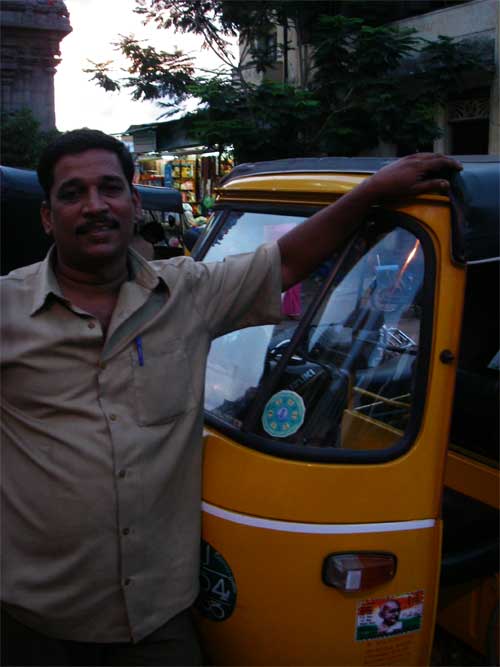Semester at Sea Fall
2006 Voyage 
- Home Page
- My bio
- Multisited Ethnography Project
- Shipboard Interview
- Cultureshock in Your Own
Country---Japan
- Food and Helth in Hong Kong
- Sleeping Vietnamese
- Embarassement at
Paying---Myanmar
- Rickshaw
Drivers in
Chennai---India
- Soccer Culture in Istanbul---Turkey
- Wedding in Cairo---Egypt
- Souvenir Sellers around Ben
Thanh Market---Vietnam
- Souvenir Sellers in
Giza---Egypt
- Open Letter
Rickshaw Drivers in Chennai
India
by Tatsuru Kimura

At
the second day
of a home stay in
As well as other SAS students, I had to experience arguments with rickshaw drivers in Chennai. As soon as I exited the gate of the port, several rickshaw drivers in khaki shirts surrounded me. Some of them surely try to take advantage of tourists by telling lies. One of them told me that a bank is too far to walk to, although I could see the bank building from where we were. Another driver said that a museum is 20 kilometers away and I would have to pay $20. I just ignored them because I doubted what they said and caught another rickshaw. Although the driver did not speak English, I negotiated with him and he took me to the museum for only 70 Rupees. Although I realized that he swindled 10 Rupees from me when he gave me change, I did not feel like complaining about it because the fare was so cheap. Speaking English can be a significant advantage for rickshaw drivers in this city, and tourists can be a best customer for drivers who speak English.
I always had to
pay when I got off the rickshaw, and most of time, I had to argue about
how
much I should pay because drivers try to take as much money as they can. What is interesting for me is that every
rickshaw
driver asked me whether I was happy to pay a certain amount of money
after they
had taken an unreasonable amount from me. In Cinema and the Urban
Poor
in South India, which describes her fieldwork on the movie viewing
habits of
the Indian poor, Sara Dickey writes about the interaction between the
rich and
the poor in
I know there are also many honest drivers, but I am interested in the “dishonest behavior” of rickshaw drivers, such as I mentioned above. I wonder whether these dishonest behaviors against tourists would disappear when they become financially secure. I want to visit Chennai again when the urban poor have reached more viable living standard.